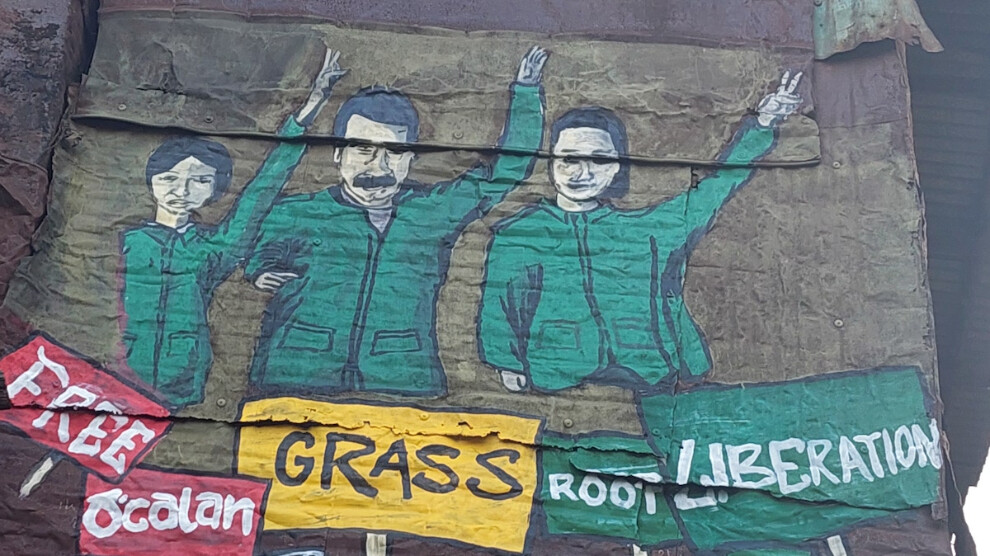Grassroots Liberation Movement in Kenya condemns repression of Wahenga artists
The Grassroots Liberation Movement in Kenya issued a statement to condemn repression of artists in Nairobi for a mural of Abdullah Öcalan they painted in Nairobi.
The Grassroots Liberation Movement in Kenya issued a statement to condemn repression of artists in Nairobi for a mural of Abdullah Öcalan they painted in Nairobi.

The Grassroots Liberation Movement in Kenya caught the attention of many people around the globe several weeks ago, with an impressive mural campaign expressing international solidarity in support of the cause of the freedom of Abdullah Öcalan.
Now the group of young artists behind the mural campaign, a group known as the Wahenga, are being targeted by the Nairobi municipal government, threatened with arrest should they paint any more murals.
The Grassroot Liberation Movement said in a statement: "The Wahenga have been painting murals for over five years. They have done over 100 murals, but never before have they come up against the authorities like this. Indeed, not long ago, the state had even contracted them to warn the public about COVID. But now, the Wahenga are accused of having caused a “public disturbance.” The municipal authorities have come brandishing bylaws according to which the young artists could be arrested and prosecuted for pursuing their work. Evidently, by centring the cause of Öcalan in their murals, the Wahenga have gone off script."
The statement added: "This incident serves to reveal the neo-colonial nature of the Kenyan state, the ease with which NATO powers can get the local authorities to do their dirty bidding. Because it would seem most likely that the Turkish embassy and/or intelligence apparatus intervened to achieve this result. Though the CIA directly acting on behalf of their Turkish allies cannot be ruled out either. Nor, for that matter, is it altogether impossible that this be the result of some autonomous, local initiative, intended to nip in the bud a potentially explosive ideological concoction."
The statement continued: "Indeed, the incident also underscores just how dangerous the state perceives the connection between Öcalan’s cause and the mobilization of the ghetto youth to be. It should not be forgotten that it was only during the Kibaki presidency that the Mau Mau was officially exonerated in the country, removed from the status of a terrorist organization. The existential conditions in the informal settlements are abysmal. The material bases of consent would seem to be altogether absent. Ideological manipulation combined with brute coercion, the dominant mode of rule. Ethnic divisions stoked, horizontal violence propagated, religious subservience stimulated, police power promoted. These are the tricks of the trade, by which the people have been so far effectively divided and conquered. For generations now. But the conditions are ripe for a revolution. If only collective consciousness could be cultivated. Which is why the weapons of the Wahenga, the murals, the music, the revolutionary message expressed through the medium of art, is deemed so dangerous. Because it is dangerous, vis-a-vis this corrupt and evil system, a system which allows the multitudes to languish in abject poverty while the few live in the lap of luxury, Lavington style."
The statement underlined that "the current president's father was the founder of the nation. The legacy his dad left was one of great inequality. And in the generation since, under Moi, then Kibaki, and now (not yet) “Uhuru,” those inequalities have only been exacerbated much further. The social justice centers, and now the Grassroots Liberation Movement, have struck fear in the hearts of those whose job it is to protect and preserve existing social property relations. And so the authorities lash out, intent on intimidating the messengers into silence. But the Wahenga will not be so easily intimidated. For they are convinced that they have Jah on their side. They believe in the promise, that prophecies are unfolding, that the reign of equal rights and justice is at hand.
It is no mere coincidence that Abdullah Öcalan was abducted in Nairobi. For he was the bearer of a revolutionary flame - a flame that is still burning, a fire that can and has been kindled, and whose heat indeed irradiates ever more intensely by the day. Öcalan's prophetic message - his paradigm of social ecology, his program of democratic confederalism - has been received with enthusiasm across the informal settlements. Among those who have nothing to lose but their chains. So let the established order tremble, if it must. Because Babylon is falling, and Zion is destined to rise. Out of the ashes, like a phoenix, a new world, the Wahenga’s new world, shall be forged."